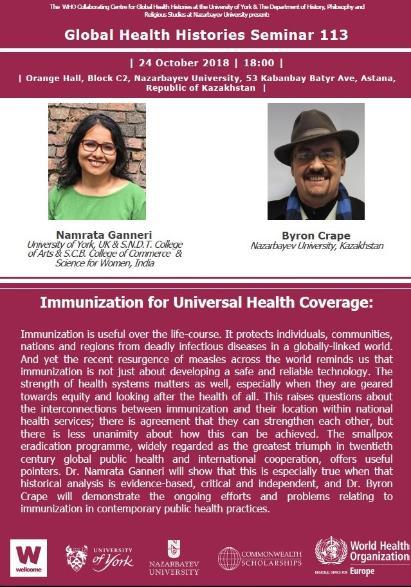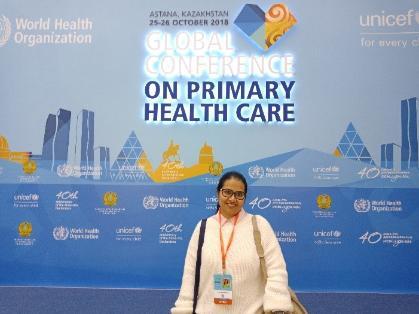CGHH at the Global Conference on Primary Health Care – an update from Dr Namrata Ganneri
A report on Namrata Ganneri's recent visit to the Republic of Kazakhstan
Dr Namrata R Ganneri, a Commonwealth –Rutherford Fellow at the University of York, was hosted by Nazarbayev University (NU), Astana, Republic of Kazakhstan, on 23 and 24 October 2018. During this time she took part in a number of events, including representing CGHH and the Department of History at the landmark Global Conference on Primary Health Care.
Dr Ganneri spoke at the 113th Global Health Histories Seminar ‘Immunization for Universal Health Coverage’ on 24 October 2018, discussing her post -doctoral research on smallpox eradication in India alongside Dr Byron Crape (School of Medicine, NU). Dr Ganneri underlined the importance of a series of pilot projects conducted in the early 1960s and argued that, though under acknowledged , research and learning emanating from these pilots led to the eventual success of the global eradication campaign. Dr Crape then documented anti-vaccination campaigns arising in high income countries and the deleterious impact of dissemination of such messages to low and medium income countries through the internet and digital media. The event was organized by the CGHH team in close collaboration with NU. A recording of this seminar will shortly be available via CGHH’s YouTube channel.

Dr Ganneri also represented CGHH and the Department of History at the ‘Global Conference on Primary Health Care: from Alma-Ata Towards Universal Health Coverage and the Sustainable Development Goals’ organized by the WHO, UNICEF and Ministry of Health of the Republic of Kazakhstan on 25 and 26 October 2018. As part of this conference, CGHH co-organized a café session and Global Health Histories seminar, ‘Birth of primary health care: celebrating 40 years of the Alma-Ata Declaration’ with Dr Niels Brimnes (Aarhus University, Denmark) and Dr Claudia Stein (Director, Division of Information, Evidence, Research & Innovation, WHO Regional Office for Europe) as the principal speakers. Dr Brimnes showed that ideas of primary health care adopted in Alma-Ata were in fact in vogue from the 1930s and it was a series of ideological-political conjunctures that facilitated the declaration in 1978. Dr Stein, while paying a personal tribute to Halfdan Mahler, the architect of Alma-Ata, stated that the process of systematic gathering and compilation of data begun in the European region was the most important legacy of the adoption of the declaration (Claudia Stein Astana Presentation (MS PowerPoint ![]() , 5,816kb)). An exhibition on the history of community health workers, drawing on research undertaken as part of Alexander Medcalf and Joao Nunes' Wellcome Trust Seed Award was also on display at the conference venue. The exhibition comprised photographs of community health workers and their diverse roles drawn from the WHO’s historic visual archive.
, 5,816kb)). An exhibition on the history of community health workers, drawing on research undertaken as part of Alexander Medcalf and Joao Nunes' Wellcome Trust Seed Award was also on display at the conference venue. The exhibition comprised photographs of community health workers and their diverse roles drawn from the WHO’s historic visual archive.

During her time in Kazakhstan, Dr Ganneri also delivered a lecture, titled ‘Religion Meets Feminism? Religion, Politics and the quest for Gender Equality in Contemporary India’ as part of the History, Philosophy and Religious Studies (HPRS) department seminar series on 23 October 2018. Drawing insights from her doctoral work on Hindu right wing women’s mobilization in India, Dr Ganneri commented on conundrums in the contemporary feminist movement arising from Muslim women’s mobilization for abolition of discriminatory religion based divorce laws and Hindu women’s temple entry movements in recent times.
Dr Ganneri’s travel to Astana and participation in various events in the capital city was facilitated by generous support of the Commonwealth Scholarship Commission.